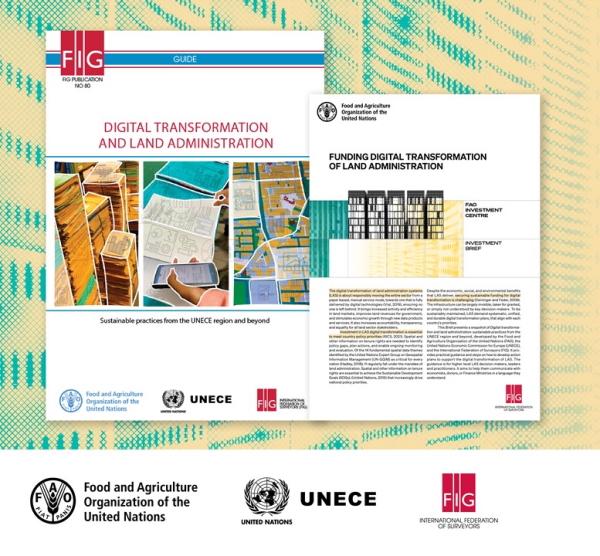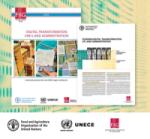News in 2022

|
Land administration systems go digital - Two new FAO, UN and FIG
Publications
October, 2022
Fig publication 80 - Digital transformation and land administration
- Sustainable practices from the UNECE region and beyond and
FAO Knowledge for Investment Brief: Funding Digital Transformation for
Land Administration

Land administration systems are increasingly becoming digitized,
making applying for a mortgage, say, or registering a new building or
property deed easier.
When done responsibly, the digital transformation of land administration
systems carries many benefits.
It can increase activity and efficiency in land markets, improve land
revenues for governments and stimulate economic growth through new data
products and services.
It can also increase accountability, transparency and equality for all
land sector stakeholders.
Yet securing sustainable funding for the digital transformation is still
a challenge.
Funding digital
transformation of land administration is a new FAO investment brief.
It summarizes the main findings of a soon to launch e-book titled
Digital Transformation and Land Administration: Sustainable Practices
from the UNECE Region and Beyond. The latter was the product of a
fruitful collaboration between FAO, the United Nations Economic
Commission for Europe (UNECE) and its Working Party for Land
Administration (WPLA), and the International Federation of Surveyors
(FIG).
The investment brief provides practical guidance and steps on how to
develop action plans to support the sustainable digital transformation
of land administration systems.
Rumyana Tonchovska, Senior FAO Land Administration Officer, explained
that “spatial and other information on tenure rights, in alignment with
wider governmental polices and broader societal goals, is needed to
identify policy gaps and plan actions to deal with countries’ most
pressing issues.”
Those issues include everything from reducing poverty, enhancing climate
change adaptation and mitigation and promoting clean energy policies to
improving food security and creating more sustainable cities and rural
environments, among others.
“That information also enables ongoing monitoring and evaluation and is
essential for meeting the Sustainable Development Goals,” she added,
noting that the brief is designed to help higher-level land
administration decision-makers, leaders and practitioners communicate
effectively with economists, donors and finance ministers.
The new normal
Digital disruption is becoming the new normal. Embracing this disruption
in land administration systems is an opportunity for operational
improvements and strategic advancement.
The e-book
Digital
Transformation and Land Administration was inspired by land administration experiences across the
globe during the COVID-19 pandemic. It shows that land administration
systems coped – and often thrived – during lockdowns. This was largely
thanks to their digital transformation, which makes the case for
upscaling the digital transformation of land administration systems all
the more urgent.
Digitized systems can reduce the cost of essential services or make them
free. In Bulgaria, Croatia, Serbia, Bosnia and Herzegovina, Moldova and
other countries, for example, citizens can run limited free online
checks on the status of their property. This helps remove travel, paper
documents and long queues at government offices.
Land administration systems are also becoming more intelligent,
interoperable, inclusive, interactive, incorporated and invested in.
They respond to diverse local drivers and complex megatrends. This
includes demographic changes, increasing societal disparities, economic
volatility, newly emerging business ecosystems, anthropogenic
environmental damage, decentralized operating environments, political
power shifts and rapid urbanization.
As with all digital disruption, it is essential to ensure that no one is
left behind – and that the digital divide does not widen.
Context matters
The investment brief points out that land administration system
organizations without an action plan for digital transformation must
create one.
Those whose systems are already on a digital path, should re-evaluate
current plans and seek opportunities for acceleration.
In the short term, these organizations should establish a cross-sector
committee, adopt the disruption paradigm, develop action plans and
encourage global and regional engagement.
In the medium term, actions should focus on adopting a plan, sourcing
investment and implementation.
Clear goal setting, indicators, underlying data analytics, cybersecurity
measures and IT upskilling can help manage risks and sustain the
performance of the systems.
Louise Friis-Hansen, FIG Director, pointed out that context matters.
“There is no ‘one size fits all approach’ for the digital transformation
of land administration systems,” she said. “Solutions need to be
tailored to local contexts, needs and drivers, but there are valuable
lessons to be learned from different experiences, regionally and
nationally, which should be shared.”
October 2022

























